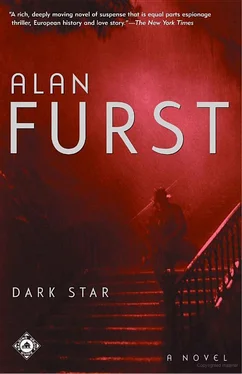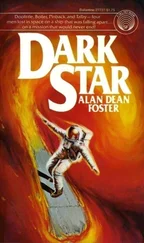Alan Furst - Dark Star
Здесь есть возможность читать онлайн «Alan Furst - Dark Star» весь текст электронной книги совершенно бесплатно (целиком полную версию без сокращений). В некоторых случаях можно слушать аудио, скачать через торрент в формате fb2 и присутствует краткое содержание. Жанр: Шпионский детектив, на английском языке. Описание произведения, (предисловие) а так же отзывы посетителей доступны на портале библиотеки ЛибКат.
- Название:Dark Star
- Автор:
- Жанр:
- Год:неизвестен
- ISBN:нет данных
- Рейтинг книги:3 / 5. Голосов: 1
-
Избранное:Добавить в избранное
- Отзывы:
-
Ваша оценка:
- 60
- 1
- 2
- 3
- 4
- 5
Dark Star: краткое содержание, описание и аннотация
Предлагаем к чтению аннотацию, описание, краткое содержание или предисловие (зависит от того, что написал сам автор книги «Dark Star»). Если вы не нашли необходимую информацию о книге — напишите в комментариях, мы постараемся отыскать её.
Dark Star — читать онлайн бесплатно полную книгу (весь текст) целиком
Ниже представлен текст книги, разбитый по страницам. Система сохранения места последней прочитанной страницы, позволяет с удобством читать онлайн бесплатно книгу «Dark Star», без необходимости каждый раз заново искать на чём Вы остановились. Поставьте закладку, и сможете в любой момент перейти на страницу, на которой закончили чтение.
Интервал:
Закладка:
He stood and turned back the covers and she padded past him, heavy-footed on the bare wooden boards, and slid herself in carefully, staring at the ceiling as he undressed. He got in next to her, lying on his side, head propped on his hand. She turned toward him and started to tell him something, but he had guessed and stopped her from saying it. When, almost speculatively, he touched her nipples with his flattened palm, she drew a sharp breath through closed teeth and squeezed her eyes shut, and if he’d not been who he was, had not done everything he’d done, he would have been stupid and asked her if it hurt.
He was too excited to be as clever as he wanted to be; it was the nature of her, generosity and hunger mixed, heat and warmth at once, the swollen and smooth places, pale colors and dark, the catch of discovery in her breathing, and the way she abandoned not innocence-he’d been wrong; she had never been innocent-but modesty, the way she crossed her barriers.
“Lift up a little,” he said.
For a time he was afraid to move, her hands trembling against his back, then, when he did, he was in anguish when it ended. A little later she got out of bed to go down the hall, not bothering to put anything on, a pretty wobble in the way she walked, I know you’re watching.
When she returned, she took the cigarette away from him and stubbed it out in the ashtray. So many things she had thought about for such a long time.
Thursday morning was cold and windy under dirty skies of shattered gray cloud. The streets to the factory district, at the northern reaches of the city, were banked by soot-stained hills of snow. Szara’s taxi was driven by a meat-colored giant with crossed swastika flags bound to his sunvisor with ribbon, and, as they drove through the Neukolln district, where miles of factories mixed with workers’ flats, he hummed beer songs and chattered on about the virtues of the New Germany.
The Baumann wire mill proved hard to find. High, brown brick walls, name announced by a small, faded sign, as though anybody who mattered should know where it was. Szara was amused by the driver, whose face twisted with near-sighted effort as he looked for the entry gate.
A business-day Baumann awaited him in a cluttered office that looked out on the production lines. Szara found him edgy, over-active, eyes everywhere at once, and not at all stylish in a green V-neck sweater worn beneath a sober suit to keep out the chill of the factory. The narrative of the tour was delivered in a shout that was barely audible above the noise of the machinery.
Szara was a little dazed by it all. He’d arrived still in a lover’s state of being, sensual, high strung, and the roaring hearth fires and clattering belt drives pounded at his temples. Steel was really the last thing in the world he wanted to think about.
One bad moment: he was introduced to Herr Haecht, a dour man in a smock, distracted from tally sheets on a clipboard when Baumann yelled an introduction. Szara managed a smile and a limp handshake.
Chicken sandwiches and scalding coffee were served in the office. When Baumann slammed the glass-paneled door, the racket of the place diminished sufficiently that a conversation could be held in almost normal tones.
“What do you think of it?” said Baumann, eager for his visitor to be impressed.
Szara did his best. “So many workers …”
“One hundred and eight.”
“And truly on a grand scale.”
“In my father’s day, may he rest in peace, no more than a workshop. What he didn’t make wasn’t worth mentioning-ornamental fence palings, frying pans, toy soldiers.” Szara followed Baumann’s eyes to a portrait on the wall, a stern man with a tiny mustache. “And everything by hand, work you don’t see anymore.”
“I can only imagine.”
“One naturally cannot compare systems,” Baumann said diplomatically. “Even our largest mills are not so grand as the Soviet steel works at Magnitogorsk. Ten thousand men, it’s said. Extraordinary. “
“Each nation has its own approach,” Szara said.
“Of course here we specialize. We are all nichtrostend.”
“Pardon?”
“One says it best in English-austenitic. What is known as stainless steel.”
“Ah.”
“When you finish your sandwich, the best is yet to come.” Baumann smiled conspiratorially.
The best was reached by way of two massive doors guarded by an elderly man seated on a kitchen chair.
“Ernest is our most senior man,” Baumann said. “From my father’s time.” Ernest nodded respectfully.
They stood in a large room where a few workers were busy at two production lines. It was much quieter and colder than the other part of the factory. “No forging here,” Baumann explained, grinning at the chill overtaking Szara. “Here we make swage wire only.”
Szara nodded, drew a pencil and a notebook from his pocket. Baumann spelled the word for him. “It’s a die process, steel bars forced through a swage, a grooved block, under enormous pressure, which produces a cold-worked wire.”
Baumann took him closer to one of the production lines. From a table he selected a brief length of wire. “See? Go ahead, take it.” Szara held it in his hand. “That’s 302 you’ve got there-just about the best there is. Resists atmosphere, doesn’t corrode, much stronger than wire made from molten steel, this is. Won’t melt until around twenty-five hundred degrees Fahrenheit, and its tensile strength is greater than that of annealed wire by a factor of approximately one third. Hardness can be figured at two hundred and forty on the Brinnell scale as opposed to eighty-five. Quite a difference all ‘round, you’ll agree.”
“Oh yes.”
“And it won’t stretch-that’s the really crucial thing.”
“What is it for?”
“We ship it to the Rheinmetall company as multiple strands twisted into cable, which increases its strength by a considerable factor but it remains flexible, to pass under or around various barriers, yet extremely responsive, even at great length. That’s what you need in control cable.”
“Control cable?”
“Yes, for aircraft. For instance, the pilot sets his flaps by controls in his cockpit, but it’s Baumann swage wire that actually makes the flaps go down. Also the high-speed rudder on the tail, and the ailerons on the wings. These are warplanes! They must bank and dip, dive suddenly. Response is everything, and response depends on the finest control cables.”
“So you are very much a factor in Luftwaffe rearmament.”
“In our own specialty, one could say preeminent. Our contract with Rheinmetall, which installs control cable on all heavy bombers, the Dornier 17, the Heinkel 111, and the Junkers 86, is exclusive.”
“All the swage wire.”
“That’s true. A third production line is contemplated here. Something around four hundred and eighty feet per aircraft-well, it’s quite a heavy demand.”
Szara hesitated. They were on the brink now; it was like sensing the tension of a diver at the instant preceding a leap into empty air. Baumann remained supremely energetic, expansive, a businessman proud of what he’d accomplished. Did he understand what was about to happen? He had to. He had almost certainly contrived this meeting, so he knew what he was doing. “It’s quite a story,” Szara said, stepping back from the edge. “Any journalist would be delighted, of course. But can it be told? ” A door, he thought. Will you walk through it?
“In the newspaper?” Baumann was puzzled.
“Yes.”
“I hardly think so.” He laughed good-naturedly.
Amen. “My editor in Moscow misinformed me. I’m normally not so dense.”
Baumann clucked. “Not so, Herr Szara, you are not anything like dense. Of Soviet citizens who might turn up in Germany, outside diplomatic staffs or trade missions, your presence is quite unremarkable. Surely not liked by the Nazis, but not unusual.”
Читать дальшеИнтервал:
Закладка:
Похожие книги на «Dark Star»
Представляем Вашему вниманию похожие книги на «Dark Star» списком для выбора. Мы отобрали схожую по названию и смыслу литературу в надежде предоставить читателям больше вариантов отыскать новые, интересные, ещё непрочитанные произведения.
Обсуждение, отзывы о книге «Dark Star» и просто собственные мнения читателей. Оставьте ваши комментарии, напишите, что Вы думаете о произведении, его смысле или главных героях. Укажите что конкретно понравилось, а что нет, и почему Вы так считаете.












